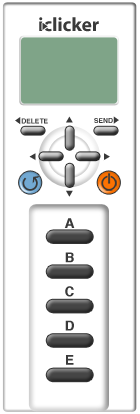 iClicker2:
All students must have an iClicker2. We have officially switched to the iclicker2 (not the original iclicker) - see picture to the left.
These are available at a variety of outlets including the University Co-op.
We will use them daily in class. You will register the iClicker2 number via the iClicker website (
www.iclicker.com),
and then you are good to go. (Make sure you enter your UT EID when prompted to enter your student ID. Some students mistakenly enter the long number on their UT ID.
Also, for this class, you must register your iClicker2 on the iClicker web site NOT via Blackboard!! Some classes require that you register your
Clicker on Blackboard or in Quest, we need you to register on www.iClicker.com, so you may have to register in multiple places.)
iClicker2:
All students must have an iClicker2. We have officially switched to the iclicker2 (not the original iclicker) - see picture to the left.
These are available at a variety of outlets including the University Co-op.
We will use them daily in class. You will register the iClicker2 number via the iClicker website (
www.iclicker.com),
and then you are good to go. (Make sure you enter your UT EID when prompted to enter your student ID. Some students mistakenly enter the long number on their UT ID.
Also, for this class, you must register your iClicker2 on the iClicker web site NOT via Blackboard!! Some classes require that you register your
Clicker on Blackboard or in Quest, we need you to register on www.iClicker.com, so you may have to register in multiple places.)


Calculator: You will likely find a calculator useful for the course. During class (as long as we are not taking a quiz or exam) you can use any type of calculator. However, during the test you need to have a nonprogrammable, scientific calculator. You should be able to pick one up for around $15.00 anywhere that sells school supplies. I would avoid a solar powered calculator because sometimes the lighting isn’t good in exam rooms. You can never use a wireless device as a calculator or a programmable calculator during an exam.

We do not have a required textbook for this course. For further reading on any topic covered in class we will point you to reliable web resources, such as Wiki Chemistry. However, if you are more comfortable having a textbook, we suggest you purchase a used Chemical Principles type textbook. Some solid books that we have reviewed are the 4th, 5th or 6th edition of Chemical Principles, by Steven S. Zumdahl; Chemical Principles by Atkins & Jones, 3rd, 4th or 5th editions; Principles of Modern Chemistry by Oxtoby, et al, 4th, 5th or 6th editions. These books are all a solid resource for further reading. Some people will find a textbook an extremely helpful resource, while others will not. Therefore, purchasing a textbook isn’t required.
Click the button below for more information on the textbook policy.

This course makes use of the web-based Quest content delivery and homework server system maintained by the College of Natural Sciences. Quest is also the basis for all of our exams. During the semester this service requires a $25 charge per student for its use, which goes toward the maintenance and operation of the resource. For the bootcamp the is no charge for Quest.
The purpose of this bootcamp is to orient you to college level learning. We will have both in-class and out-of-class learning experiences that focus on chemistry concepts. At the same time will develop specific study skills that will help us succeed in science. Next we will put these skills to the test with a few chemistry exams. Finally we will have a little fun as well as get to know some new chemistry study buddies.
We will have a "mid-term" and a "final". The mid term will cover the material from the first two learning sessions. The final will be comprehensive and cover all of the "bootcamp" materials. Each examination will consist of multiple-choice questions that will be machine graded, plus a hand graded section which will include short answer,
model explanation, problem solving, etc...
Opportunities to test your prior knowledge, your progress on the learning curve and your mastery of chemical principles will be given in class using iClickers.
These opportunities will come in the form of “Clicker Questions”. Each Clicker question is worth 10 points. On any given day in class, we might have between
5 and 15 Clicker questions. Those Clicker question points will accumulate throughout the period of a three-week Unit. At the end of the Unit the Clicker
Question points will be added to the homework and learning module point totals to give your participation points for that Unit. To get a perfect participation
score you will need to have earned 90% of the total possible participation points for the Unit. This way if you forget your Clicker one day, or your batteries go
dead, or some other event prevents you from attending class one day, your grade will not be affected. A fully engaged student will have a participation point score
in the 90’s. Anything less indicates something is not quite working.
We will have two types of iClicker questions. Some will be participation only where all you need to do is try (more formative in nature).
Other questions will require you to get the correct answer to score the points (more summative in nature). In both cases (formative and summative questions)
we will sometimes encourage you to work in small groups to practice articulating your thoughts and speaking the language of chemistry.
This group time is deliberate and designed to help you solidify your concept of basic chemical principles. Taking advantage of this time and fully
engaging in the group work will help lead you to success in this class.
We will be using the Quest online learning and assessment system with two types of graded assignments: Learning Modules and Homework Sets. Learning Modules are designed to introduce new concepts and/or direct teach basic skills outside of class. Homework Sets are a series of problems that you should work through to help you solidify your conceptual understanding of the material and to develop more sophisticated problem-solving skills. Skill drilling worksheets will be provided, but will not be graded. The drilling worksheets are designed to help build your problem solving skills such that you can successfully complete your Homework Set. Each type of assignment has been designed for a particular purpose to help you master the learning outcomes for this course. To this end, each assignment should be completed in the order in which it was assigned. Learning Modules will typically be shorter than the homework assignments. The graded Learning Modules and Homework Sets will be counted toward your participation points (with each question worth 10 points). Do not guess on the Homework Sets as negative points are assigned for the second wrong answer choice. You can earn back points on the assignment, if you get it correct the next time you input an answer. You will lose more points, each subsequent wrong guess.
If you get caught cheating in any way, whatsoever, you will have to discuss the situation with us. We will arrive at a penalty and write up a formal report. The minimum penalty for cheating is receiving a 0 on the assignment on which you cheated. In this class, in addition to all the traditional types of cheating (looking at someone else’s answer, utilizing “cheat sheets” of any form or fashion – paper or digitized, getting an advance copy of an exam or quiz), we also consider allowing someone else to use your iClicker cheating. For example, if you send your iClicker to class with another class mate or an individual who is not you and you are caught, you and your accomplice will be penalized. If you deny the allegation, we will proceed by filing a formal report to the Judicial Services in the Dean of Students Office as is policy. Judicial Services would decide the final penalty after a hearing on the matter. For more information, read in the General Information Catalog about scholastic dishonesty (i.e. cheating).
Please notify me of any modification/adaptation you may require to accommodate a disability-related need. You will be requested to provide documentation to the Dean of Students' Office, in order that the most appropriate accommodations can be determined. Specialized services are available on campus through Services for Students with Disabilities. The official wording is this: The University of Austin provides upon request appropriate academic accommodations for qualified students with disabilities. For more information, contact the Office of the Dean of Students at 471-6259, 471-6441 TTY or Division of Diversity and Community Engagement, Services for Students with Disabilities, 512-471-6259, www.utexas.edu/diversity/ddce/ssd
The last day to drop the course for academic reasons is Tuesday, November 5, 2012. This will require you to go to your college and get a drop form. You then must bring the form to me and get my approval and signature. After this deadline, students must go to the Dean's office, WCH 2.112, to begin the appeal for substantiated non-academic reasons.
Religious holy days sometimes conflict with class and examination schedules. It is the policy of The University of Texas at Austin that the student must notify each instructor at least fourteen days prior to the classes scheduled on dates he or she will be absent to observe a religious holy day. For religious holidays that fall within the first two weeks of the semester, the notice should be given on the first day of the semester. The student may not be penalized for these excused absences but the instructor may appropriately respond if the student fails to complete satisfactorily the missed assignment or examination within a reasonable time after the excused absence.
Occupants of buildings on The University of Texas at Austin campus are required to evacuate buildings when a fire alarm is activated. Alarm activation or announcement requires exiting and assembling outside. Familiarize yourself with all exit doors of each classroom and building you may occupy. Remember that the nearest exit door may not be the one you used when entering the building. Students requiring assistance in evacuation shall inform their instructor in writing during the first week of class. In the event of an evacuation, follow the instruction of faculty or class instructors.
Do not re-enter a building unless given instructions by the following: Austin Fire Department, The University of Texas at Austin Police Department, or Fire Prevention Services office. Behavior Concerns Advice Line (BCAL): 512-232-5050